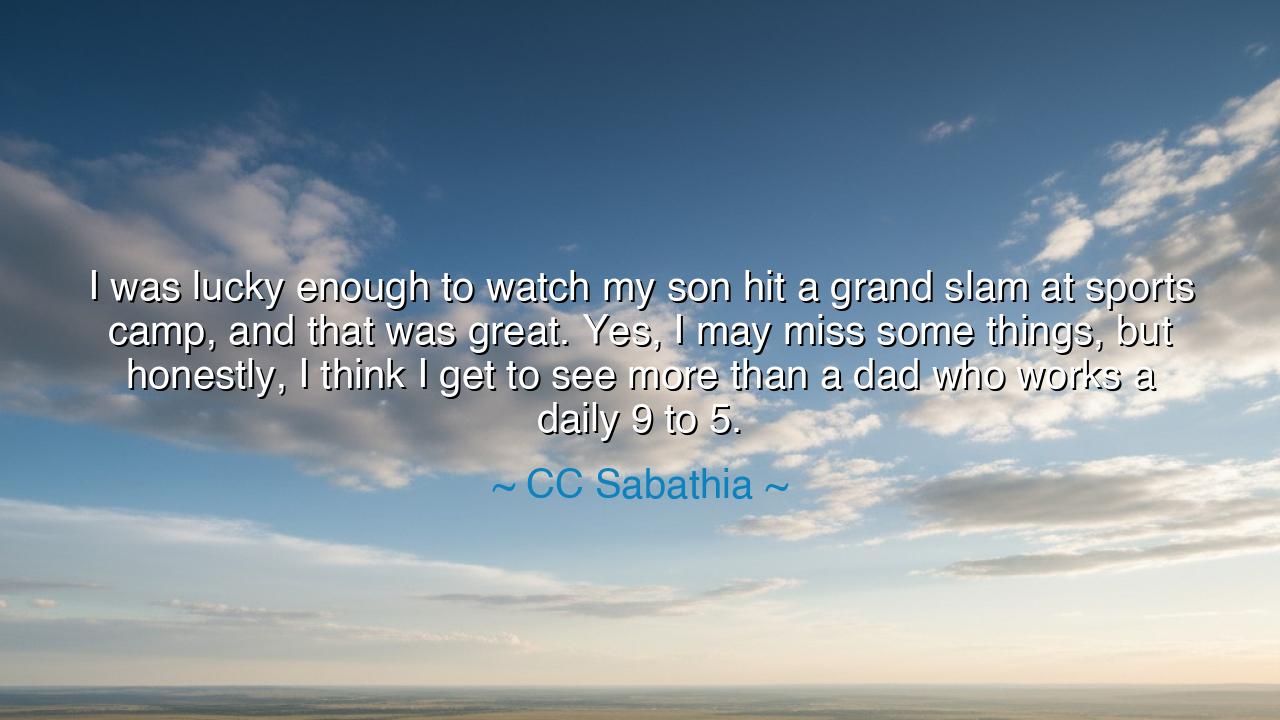
I was lucky enough to watch my son hit a grand slam at sports
I was lucky enough to watch my son hit a grand slam at sports camp, and that was great. Yes, I may miss some things, but honestly, I think I get to see more than a dad who works a daily 9 to 5.






Hear, O keepers of family and labor, the heartfelt words of CC Sabathia, who said: “I was lucky enough to watch my son hit a grand slam at sports camp, and that was great. Yes, I may miss some things, but honestly, I think I get to see more than a dad who works a daily 9 to 5.” Within these tender words lies not only the joy of a father but the eternal struggle between duty and devotion, between work and presence, between what we must do to sustain life and what we long to do to live it fully.
Sabathia, a man forged in the fires of professional sport, speaks not merely as a father but as one who understands the high cost of ambition. The life of an athlete—like that of a warrior, sailor, or wanderer—is not one of routine, but of sacrifice and distance. Yet even amidst travel, pressure, and competition, he finds blessing in moments of presence: the sight of his son’s triumph, the echo of a bat striking destiny. In that fleeting instant, all the trophies in the world are dimmed by the light of love. This is the meaning of his words—to measure wealth not by possessions or status, but by presence and shared moments.
His reflection reminds us that time is the truest currency of love. The fathers of old knew this too. Consider the story of Odysseus, who wandered far from his home for twenty years—first at war, then at sea. He fought for glory and survival, but each night, he longed for the sight of his son, Telemachus. When he returned at last, his reunion was not with the glory of conquest, but with the quiet joy of family restored. The hero’s greatest victory was not Troy’s fall—it was simply coming home. In Sabathia’s joy at his son’s grand slam, we hear an echo of that same truth: that no achievement compares to the triumph of connection.
When he says he “gets to see more than a dad who works a daily 9 to 5,” it is not boast, but perspective. The modern father, bound to the wheel of labor, often misses the milestones that shape a child’s heart. In the quest to provide, many forget to be present. Sabathia’s life, though filled with its own demands, offers him windows of presence that others may never find. His words are not to judge, but to awaken gratitude—to remind all who labor that time with family is not a reward, but a responsibility sacred and fleeting.
There is wisdom here that stretches beyond fatherhood itself. In every life, there lies a balance to be struck between the pursuit of excellence and the preservation of relationship. Whether one is an artist, builder, teacher, or leader, the danger is the same: to achieve much, yet lose the intimacy of those we love. Sabathia’s reflection teaches that even the busiest life can be redeemed by awareness—by the ability to see the beauty of the moments we do have, rather than lamenting those we’ve lost.
The ancients taught that to live well is to live in harmony—with our work, our families, and our souls. The Stoics would say that one cannot control the span of time, but only the use of it. Thus, Sabathia’s gratitude becomes a form of wisdom: to be thankful for presence, even when imperfect; to find meaning in the fragments of time, rather than mourning the hours that duty steals away.
Let this, then, be the lesson for all who labor and love: do not wait for the perfect moment to cherish your family; cherish the imperfect ones now. Celebrate the small victories—the grand slams, the laughter, the conversations at dusk. Let your ambition serve your heart, not replace it. For in the end, the measure of a life is not how far we have gone, but how deeply we have loved along the way.
Thus, through the words of CC Sabathia, we are reminded that greatness is not only in the stadiums and the lights—it is in the stands, in the faces of our children, and in the moments when we stop to see them shine. The wise father, the mindful worker, and the grateful heart all understand this eternal truth: that the greatest victories are not won in the world, but within the home.






AAdministratorAdministrator
Welcome, honored guests. Please leave a comment, we will respond soon